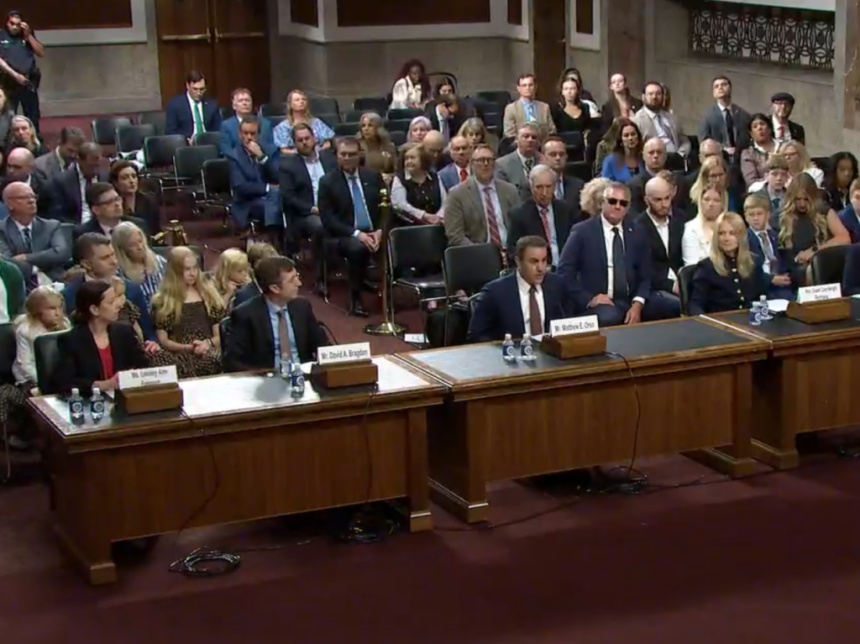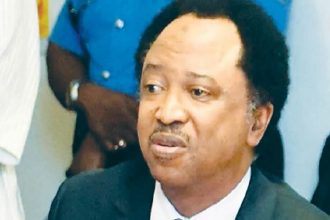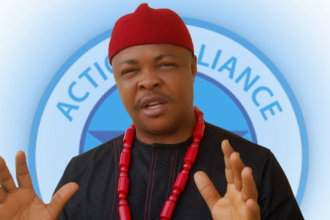From left to right: Trump nominees Lindsey Freeman, David Bragdon, Matthew Orso, and Susan Courtwright Rodriguez undergo questioning by the Senate Judiciary Committee on Wednesday, Sept. 18. (Screenshot of judiciary.senate.gov stream)
The Senate Judiciary Committee heard from four nominees for North Carolina’s federal courts on Wednesday as it considers whether to advance them to the full Senate.
The nominees, announced by President Donald J. Trump in August, received the backing of North Carolina Republican U.S. Senators Ted Budd and Thom Tillis, the latter of whom serves on the Judiciary Committee. Matthew Orso and Susan Courtwright Rodriguez are under consideration to serve on the Western District Court and David Bragdon and Lindsey Freeman are nominated for the Middle District Court.
Sen. Thom Tillis (R-N.C.) said he and Budd vetted the nominees through hours of discussions, and did not question them further during the hearing on Wednesday. (Photo by Andrew Harnik/Getty Images)
“I’m grateful to President Trump for nominating these exceptionally qualified individuals to serve as U.S. district judges for the great state of North Carolina,” said Budd, who introduced the nominees. “I have full confidence in each of these nominees and trust that they will faithfully apply the words of our Constitution and the letter of the law without resorting to the wrongful practice of judicial activism.”
Tillis lauded the four for their “impeccable credentials” and said he looks forward to their appointment to the federal bench. All have experience in the federal courts, either as clerks or through litigation.
“All four of these nominees are eminently qualified and will make the state and our country proud,” Tillis said. “There are currently only 10 active federal judges in North Carolina, not counting those on senior status, so filling these four vacancies is very important for our state.”
He noted that Orso — who he called “one of the best lawyers in North Carolina” — is nominated for the seat of the judge he clerked for, Judge Robert J. Conrad. Rodriguez, likewise, was nominated to succeed Judge Frank Whitney, whom she clerked for. Both Conrad and Whitney attended Wednesday’s hearing.
Though most of the questioning on Wednesday centered on Seventh Circuit nominee Rebecca Taibleson and Office of National Drug Control Policy director nominee Sara Carter, the prospective North Carolina judges also faced scrutiny from the committee — particularly from Sen. John Kennedy (R-La.), a frequent needler of conservative and liberal nominees alike.
Kennedy quizzed the nominees on matters including legal protections for religious practice in the workplace, supplemental jurisdiction, and the Constitutional amendment process.

David Bragdon, nominated for a judgeship in the Middle District of North Carolina, expressed uncertainty about matters of civil law. (Screenshot of judiciary.senate.gov stream)
“Supplemental jurisdiction — I am having trouble remembering that term because it does not come up in criminal practice very much,” Bragdon said.
“It’s going to come up in federal district court,” Kennedy said. “Every other Thursday.”
“I will certainly carefully research any issue that were to come before me if I’m confirmed,” Bragdon replied.
Sen. Mazie Hirono (D-Hawaii) asked Orso whether he would follow the Supreme Court’s precedent in Griswold v. Connecticut, a 1965 case protecting the use of contraceptives.
“I would follow all Supreme Court precedent if fortunate enough to be confirmed as a district court judge,” he said.
Hirono also asked Rodriguez to share her feelings after presiding over naturalization ceremonies as a magistrate judge. She answered that those are “very near and dear to my heart,” in part because her husband is the child of Cuban immigrants who became naturalized.
Carl Tobias, a law professor at the University of Richmond, said while he does not think Kennedy was “necessarily happy about the answers,” with Bragdon and Freeman expressing uncertainty over concepts in civil law, he does not expect any difficulty in any of the four being confirmed.
“I think they know their way around the courtroom, I was persuaded of that, because I think all of them had some federal court experience, and some of them quite substantial federal court experience,” Tobias said. “I do think what’s likely is there won’t be any no votes from Republicans.”
Though Tillis did not question the district nominees during the hearing, he said he and Budd subjected the four to “hours of discussion” during the vetting process.
He also extended his gratitude to his colleagues on the Judiciary Committee for preserving the “blue slip” process for judicial nominees, giving senators veto power over district court judges in their home state. Trump has placed pressure on Sen. Chuck Grassley (R-Iowa), the chair of the Judiciary Committee, to do away with the practice, which has thwarted Republican and Democratic presidents alike from confirming some of their preferred nominees.
“Chuck Grassley should allow strong Republican candidates to ascend to these very vital and powerful roles, and tell the Democrats, as they often tell us, to go to HELL!” Trump posted on Truth Social in August.
Tillis noted on Wednesday that without the blue slip, Trump would not have had the opportunity to fill two of the four North Carolina vacancies.
“It’s an institution that’s over 100 years old and it’s every bit as relevant today as it was 100 years ago,” he said.









